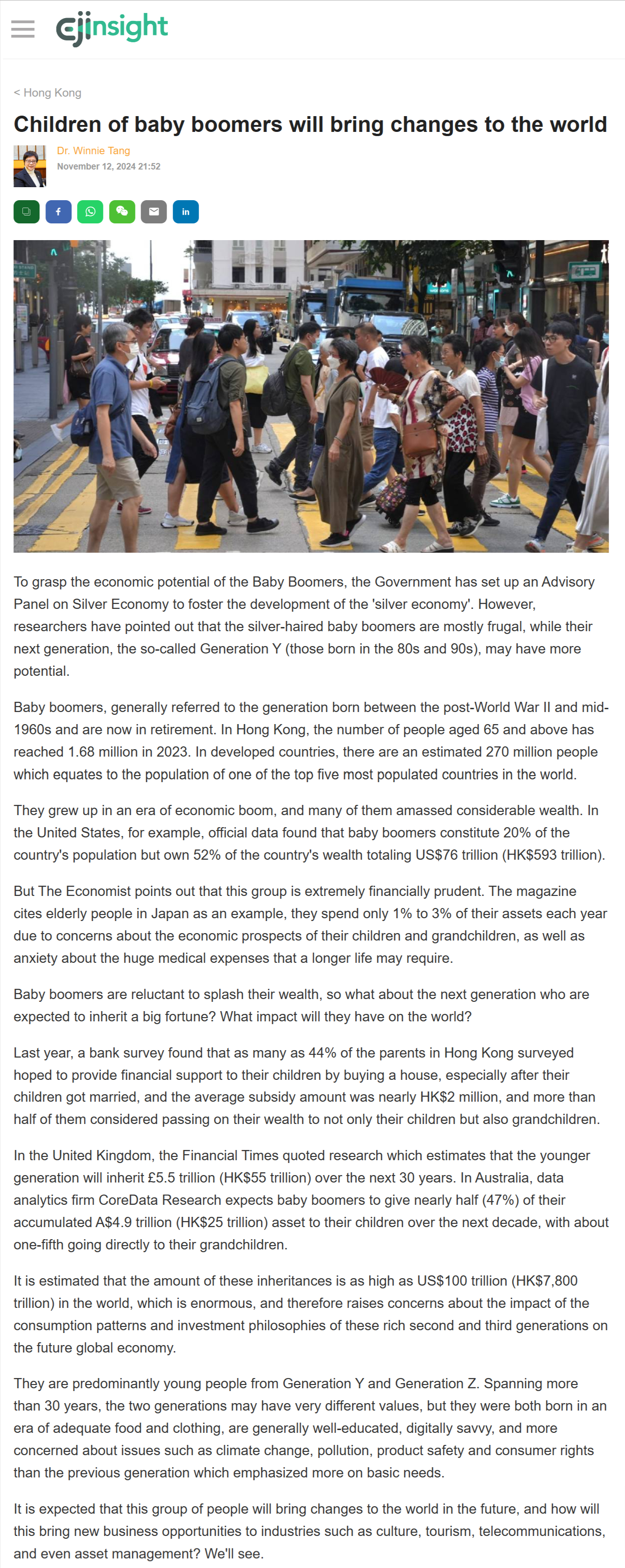網上版請按此

Children of baby boomers will bring changes to the world
To grasp the economic potential of the Baby Boomers, the Government has set up an Advisory Panel on Silver Economy to foster the development of the 'silver economy'. However, researchers have pointed out that the silver-haired baby boomers are mostly frugal, while their next generation, the so-called Generation Y (those born in the 80s and 90s), may have more potential.
Baby boomers, generally referred to the generation born between the post-World War II and mid-1960s and are now in retirement. In Hong Kong, the number of people aged 65 and above has reached 1.68 million in 2023. In developed countries, there are an estimated 270 million people which equates to the population of one of the top five most populated countries in the world.
They grew up in an era of economic boom, and many of them amassed considerable wealth. In the United States, for example, official data found that baby boomers constitute 20% of the country's population but own 52% of the country's wealth totaling US$76 trillion (HK$593 trillion).
But The Economist points out that this group is extremely financially prudent. The magazine cites elderly people in Japan as an example, they spend only 1% to 3% of their assets each year due to concerns about the economic prospects of their children and grandchildren, as well as anxiety about the huge medical expenses that a longer life may require.
Baby boomers are reluctant to splash their wealth, so what about the next generation who are expected to inherit a big fortune? What impact will they have on the world?
Last year, a bank survey found that as many as 44% of the parents in Hong Kong surveyed hoped to provide financial support to their children by buying a house, especially after their children got married, and the average subsidy amount was nearly HK$2 million, and more than half of them considered passing on their wealth to not only their children but also grandchildren.
In the United Kingdom, the Financial Times quoted research which estimates that the younger generation will inherit £5.5 trillion (HK$55 trillion) over the next 30 years. In Australia, data analytics firm CoreData Research expects baby boomers to give nearly half (47%) of their accumulated A$4.9 trillion (HK$25 trillion) asset to their children over the next decade, with about one-fifth going directly to their grandchildren.
It is estimated that the amount of these inheritances is as high as US$100 trillion (HK$7,800 trillion) in the world, which is enormous, and therefore raises concerns about the impact of the consumption patterns and investment philosophies of these rich second and third generations on the future global economy.
They are predominantly young people from Generation Y and Generation Z. Spanning more than 30 years, the two generations may have very different values, but they were both born in an era of adequate food and clothing, are generally well-educated, digitally savvy, and more concerned about issues such as climate change, pollution, product safety and consumer rights than the previous generation which emphasized more on basic needs.
It is expected that this group of people will bring changes to the world in the future, and how will this bring new business opportunities to industries such as culture, tourism, telecommunications, and even asset management? We'll see.
Dr Winnie Tang
Adjunct Professor, School of Computing and Data Science; Department of Geography, Faculty of Social Sciences, The University of Hong Kong